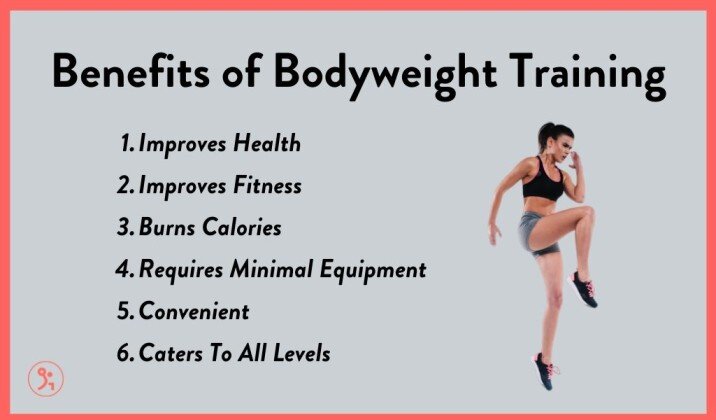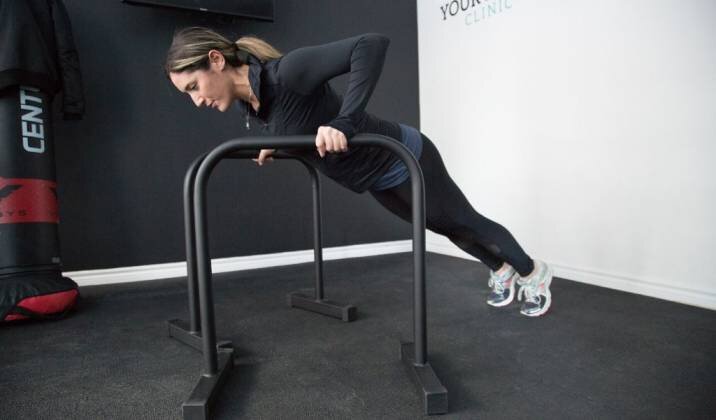Have you ever wondered if doing bodyweight exercises every day is the secret to achieving your fitness goals? Maybe you’ve heard conflicting advice and aren’t sure what to believe.
Imagine waking up each day, knowing exactly what to do to get stronger, leaner, and more energized. Wouldn’t it be amazing to have a simple routine that doesn’t require fancy equipment or a gym membership? This article is your guide to understanding whether daily bodyweight exercises are beneficial or if they could potentially hinder your progress.
By the end of this read, you’ll have clear insights that can transform the way you approach fitness. Stay with us, and let’s uncover the truth together.

Credit: fitbod.me
Benefits Of Daily Bodyweight Exercises
Daily bodyweight exercises offer many benefits for your health. They help build endurance, flexibility, and strength. You don’t need equipment, making them accessible for everyone. These exercises fit any schedule and location.
Improved Muscle Endurance
Regular bodyweight exercises increase muscle endurance. They train muscles to work longer without tiring. This boosts your stamina for daily tasks. Activities like climbing stairs become easier. Your muscles recover faster after workouts.
Enhanced Flexibility
Bodyweight exercises improve flexibility. They stretch and lengthen muscles. This reduces stiffness and pain. You move more freely and with ease. Flexibility lowers injury risks. It helps in sports and physical activities.
Convenience And Accessibility
These exercises are convenient and accessible. Perform them anywhere, anytime. No gym membership or equipment needed. Perfect for busy schedules and small spaces. They suit all fitness levels. Start with simple moves and progress gradually.
Potential Risks Of Overtraining
Bodyweight exercises offer flexibility and convenience. Many people wonder if they can perform them daily. While daily exercise has benefits, overtraining poses risks. Understanding these risks can help prevent injury and promote long-term health.
Injury Concerns
Overtraining can lead to injuries. Muscles and joints need time to recover. Without rest, they face stress and strain. This increases the risk of injuries. Overuse injuries like tendonitis become more common. Listen to your body. Pain and discomfort should not be ignored. They signal a need for rest or adjustment.
Signs Of Overtraining
Recognizing signs of overtraining is crucial. Fatigue that doesn’t go away is a key sign. Sleep patterns may change. Insomnia or restless sleep can occur. You might feel less motivated or irritable. Performance can decline even with more effort. These signs mean it’s time to reassess your routine.
Balancing Intensity And Recovery
Bodyweight exercises offer flexibility and can be done daily. It’s crucial to balance intensity and recovery for optimal results. Ensure rest days are part of the routine to prevent muscle fatigue and support growth.
Balancing intensity and recovery is crucial when you consider doing bodyweight exercises every day. You might be enthusiastic and eager to see results, but it’s important to strike a balance. Overdoing it can lead to fatigue, while undertraining might not give you the benefits you’re looking for. How do you find that sweet spot?Importance Of Rest Days
Rest days are not just for the lazy. They’re essential for muscle recovery and growth. Without them, your body doesn’t get the chance to repair and strengthen. Even if you’re doing simple push-ups or squats, your muscles need time to heal. This downtime helps prevent injuries and burnout. So, make sure to schedule regular rest days in your routine. Think of rest days as part of your training plan, not a break from it. They play a vital role in your progress. How do you feel after a day off? Ready to tackle more, right?Incorporating Varied Intensity
Mixing up the intensity of your workouts can keep things interesting and effective. One day, go hard with high-intensity exercises. The next, take it slow with light activities. This variation helps in muscle growth and improves overall endurance. It also prevents the monotony that can come with a strict routine. You can try alternating between high-intensity interval training (HIIT) and low-intensity steady state (LISS) exercises. This balance keeps your workouts fresh and your muscles guessing. Why stick to one level of intensity when you can challenge yourself in different ways?
Credit: www.youtube.com
Tailoring Exercises To Fitness Level
Bodyweight exercises can fit into daily routines when tailored to personal fitness levels. Adjust intensity and duration to prevent fatigue. Listening to your body’s signals ensures safe and effective workouts.
Embarking on a bodyweight exercise routine can be thrilling, especially when you realize you don’t need fancy equipment to get fit. However, one size doesn’t fit all. Tailoring exercises to your fitness level is crucial to ensure you’re not overdoing it or under-challenging yourself. Whether you’re a beginner finding your footing or an advanced enthusiast seeking new challenges, there’s a way to make bodyweight exercises work for you. ###Beginner Tips
If you’re new to bodyweight exercises, start simple. Push-ups, squats, and lunges are your friends. Focus on mastering the basics with proper form. Aim for shorter, consistent workouts. Try 15-20 minutes a day to build a habit without overwhelming yourself. Listen to your body. If you’re feeling fatigued, it’s okay to take a rest day. Consistency is key, but recovery is equally important. ###Advanced Modifications
For those already comfortable with standard exercises, it’s time to spice things up. Add variations like diamond push-ups or pistol squats to increase difficulty. Incorporate explosive movements. Think jump squats and burpees to elevate your heart rate and build power. Challenge yourself with a goal. Can you increase your reps or decrease your rest time? Push boundaries safely. Tailoring exercises isn’t just about adjusting difficulty; it’s about creating a routine that motivates you. How can you make your workouts more exciting or challenging?Expert Opinions On Daily Workouts
Experts suggest that daily bodyweight exercises can be safe if done correctly. Pay attention to your body’s signals. Recovery is crucial to avoid overuse injuries.
Engaging in daily bodyweight exercises can spark curiosity. Many wonder about its safety and effectiveness. Experts offer varied insights. Their opinions provide valuable guidance. Understanding these perspectives can help you make informed decisions.Insights From Fitness Trainers
Fitness trainers often advocate for daily movement. They emphasize consistency over intensity. Daily workouts can build discipline. Trainers suggest varied routines. This prevents muscle fatigue. It also boosts overall fitness. Trainers recommend listening to your body. Rest when needed. They stress quality over quantity. Proper form is crucial. This ensures safety and progress.Scientific Perspectives
Science offers a different lens. Studies show benefits of daily exercise. Enhanced mood and energy levels are common. Science supports regular activity for health. Research highlights recovery importance. Muscles need time to repair. Alternating muscle groups aids recovery. This strategy can prevent overuse injuries. Science also backs gradual progression. Increasing intensity slowly is key. It prevents burnout and injuries. These insights shape effective daily workouts. “`Creating A Sustainable Routine
Bodyweight exercises are great for daily routines. They build strength without equipment. Listen to your body to prevent strain. Rest is important for recovery.
Creating a sustainable routine for bodyweight exercises can be a game-changer in achieving fitness goals. It’s essential to establish a plan that keeps you motivated without leading to burnout. Consistency is key, but so is balance. Let’s dive into how you can set up a routine that you can stick to every day.Setting Realistic Goals
Before you start, think about what you want to achieve. Do you want to get stronger, more flexible, or maybe improve your endurance? Setting clear goals helps you stay focused. Start small. If you’re new to bodyweight exercises, aim for a few minutes each day. Consider your current fitness level. If you’re feeling ambitious, remember that it’s better to increase your activity gradually.Monitoring Progress
How do you know if you’re improving? Keep track of your workouts. Use a simple notebook or an app to log your exercises. Write down the number of reps and sets you complete. Review your progress every week. Notice any improvements or areas where you might be struggling. Are you feeling stronger or more energized? These are signs your routine is working. If you find yourself plateauing, it might be time to adjust your routine. Add more reps or try new exercises to keep things interesting. By maintaining a sustainable routine, you not only achieve your fitness goals but also develop a lifelong habit. Are you ready to see how far your body can go?Listening To Your Body
Listening to your body is crucial when you consider doing bodyweight exercises every day. It’s easy to get caught up in the routine and forget how your body is responding. Paying attention to how you feel can be the difference between progress and burnout. You might be eager to see results, but your body knows when it needs rest. This section will guide you through recognizing the signs and making necessary adjustments.
Recognizing Fatigue
Fatigue isn’t just about feeling tired. It’s about noticing when your body struggles to perform exercises you usually handle with ease. You might find yourself lacking motivation or feeling sluggish during workouts. These are signs your body needs a break.
Some days, you’ll feel strong and ready to push boundaries. Other days, even simple exercises seem daunting. It’s important to recognize these fluctuations. Ignoring fatigue can lead to injury and set you back in your fitness journey.
Consider keeping a journal of your workouts and mood. Are there days when you’re consistently tired? This might be your body’s way of asking for more recovery time. It’s not about skipping workouts; it’s about prioritizing your health.
Adjusting As Needed
Adjusting your routine based on your body’s signals is vital. If you notice fatigue, try reducing the intensity or duration of your workouts. You can shift focus to stretching or yoga to give your muscles a break.
Think about the last time you pushed through a workout despite feeling exhausted. Did you regret it later? Sometimes, taking a step back can propel you forward in the long run. Listen and adapt—your body will thank you.
Flexibility in your workout routine is key. Maybe today you feel like doing fewer repetitions or skipping a particular exercise. That’s okay. The goal is to maintain a sustainable routine that keeps you healthy and motivated.
Have you ever asked yourself if your current routine is serving you well? It’s a question worth pondering. Your body is your best guide; it knows what it needs better than any fitness plan.
Remember, it’s not about how much you can do in one day. It’s about what you can sustain over many days. Let your body lead the way to a balanced and fulfilling exercise regimen.

Credit: fitbod.me
Frequently Asked Questions
Is It Safe To Do Bodyweight Exercises Daily?
Yes, it is generally safe to do bodyweight exercises daily. They are low-impact and don’t put excessive strain on joints. Listen to your body and avoid overtraining. Ensure proper form to prevent injuries. Incorporate variety to keep workouts balanced and effective.
Can You Build Muscle With Daily Bodyweight Exercises?
Yes, you can build muscle with daily bodyweight exercises. Focus on progressive overload by increasing reps or intensity. Include exercises targeting different muscle groups. Consistency is key for muscle growth. Pairing workouts with a balanced diet enhances results.
What Are Benefits Of Daily Bodyweight Workouts?
Daily bodyweight workouts improve strength, flexibility, and endurance. They require no equipment, making them convenient. Regular practice boosts mood and energy levels. It enhances cardiovascular health and helps in weight management. Suitable for all fitness levels.
How To Prevent Injury With Daily Bodyweight Exercises?
Prevent injury by warming up before workouts. Maintain proper form and technique during exercises. Gradually increase intensity and avoid overtraining. Listen to your body and rest when needed. Incorporate stretching and cooldowns to aid recovery.
Conclusion
Bodyweight exercises can fit into daily routines. They offer flexibility and ease. Listen to your body. Rest when needed. Balance is key for progress. Incorporate variety for best results. Engage different muscle groups. Aim for consistency rather than intensity. Find what suits your lifestyle.
Enjoy the journey toward fitness. Celebrate small victories along the way. Stay motivated and focused. Fitness is a lifelong commitment. Keep moving forward with confidence. Remember, every little effort counts. Prioritize health and well-being. Embrace the benefits of bodyweight workouts.
Feel empowered on your path to fitness.


